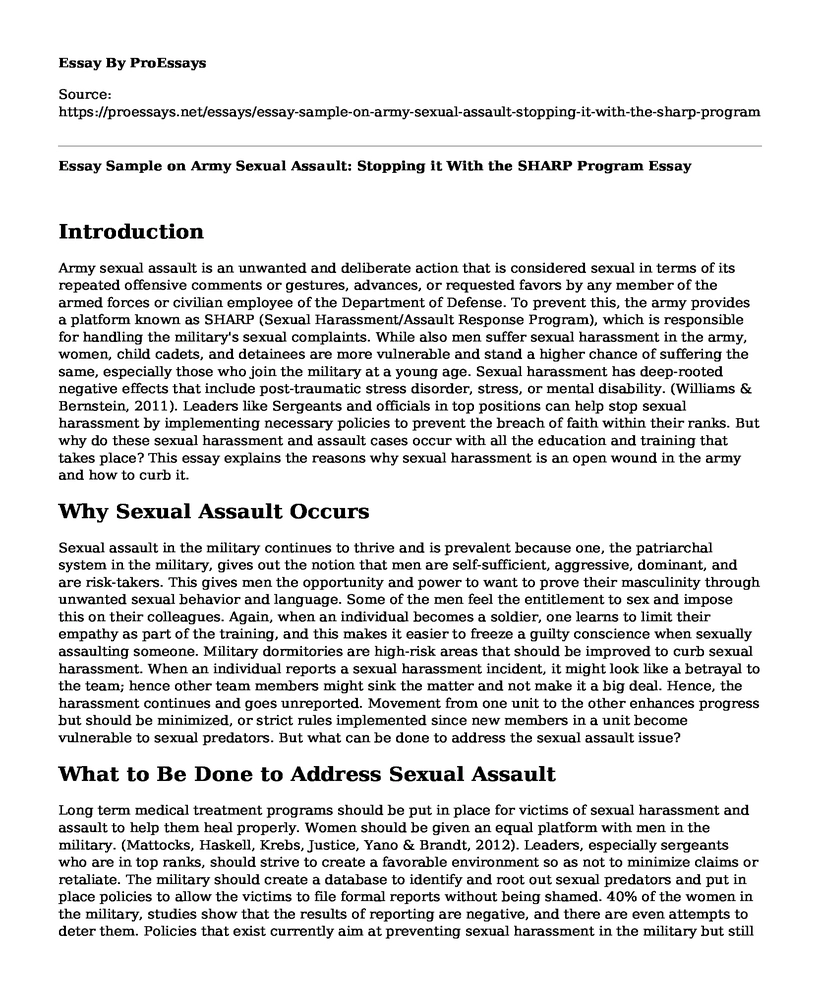Introduction
Army sexual assault is an unwanted and deliberate action that is considered sexual in terms of its repeated offensive comments or gestures, advances, or requested favors by any member of the armed forces or civilian employee of the Department of Defense. To prevent this, the army provides a platform known as SHARP (Sexual Harassment/Assault Response Program), which is responsible for handling the military's sexual complaints. While also men suffer sexual harassment in the army, women, child cadets, and detainees are more vulnerable and stand a higher chance of suffering the same, especially those who join the military at a young age. Sexual harassment has deep-rooted negative effects that include post-traumatic stress disorder, stress, or mental disability. (Williams & Bernstein, 2011). Leaders like Sergeants and officials in top positions can help stop sexual harassment by implementing necessary policies to prevent the breach of faith within their ranks. But why do these sexual harassment and assault cases occur with all the education and training that takes place? This essay explains the reasons why sexual harassment is an open wound in the army and how to curb it.
Why Sexual Assault Occurs
Sexual assault in the military continues to thrive and is prevalent because one, the patriarchal system in the military, gives out the notion that men are self-sufficient, aggressive, dominant, and are risk-takers. This gives men the opportunity and power to want to prove their masculinity through unwanted sexual behavior and language. Some of the men feel the entitlement to sex and impose this on their colleagues. Again, when an individual becomes a soldier, one learns to limit their empathy as part of the training, and this makes it easier to freeze a guilty conscience when sexually assaulting someone. Military dormitories are high-risk areas that should be improved to curb sexual harassment. When an individual reports a sexual harassment incident, it might look like a betrayal to the team; hence other team members might sink the matter and not make it a big deal. Hence, the harassment continues and goes unreported. Movement from one unit to the other enhances progress but should be minimized, or strict rules implemented since new members in a unit become vulnerable to sexual predators. But what can be done to address the sexual assault issue?
What to Be Done to Address Sexual Assault
Long term medical treatment programs should be put in place for victims of sexual harassment and assault to help them heal properly. Women should be given an equal platform with men in the military. (Mattocks, Haskell, Krebs, Justice, Yano & Brandt, 2012). Leaders, especially sergeants who are in top ranks, should strive to create a favorable environment so as not to minimize claims or retaliate. The military should create a database to identify and root out sexual predators and put in place policies to allow the victims to file formal reports without being shamed. 40% of the women in the military, studies show that the results of reporting are negative, and there are even attempts to deter them. Policies that exist currently aim at preventing sexual harassment in the military but still need to be modified to curb the problem completely. Serious consequences should face those found guilty.
Conclusion
It is evident that sexual harassment is because of the macho nature of men and the notion that they are more powerful than women, a unit's culture to assume sexual harassment cases and a reduction in empathy amongst the military that makes it easy for the sexual predators. SHARP should therefore ensure, military barracks are improved, leaders become more assertive, movement amongst units are minimized, and women are given an equal position in the military in an attempt to finish sexual harassment and assault amongst the military.
References
Mattocks, K. M., Haskell, S. G., Krebs, E. E., Justice, A. C., Yano, E. M., & Brandt, C. (2012). Women at war: Understanding how women veterans cope with combat and military sexual trauma. Social science & medicine, 74(4), 537-545. https://www.sciencedirect.com/science/article/abs/pii/S0277953611006952
Williams, I., & Bernstein, K. (2011). Military sexual trauma among US female veterans. Archives of Psychiatric Nursing, 25(2), 138-147. https://www.sciencedirect.com/science/article/abs/pii/S0883941710000774
Cite this page
Essay Sample on Army Sexual Assault: Stopping it With the SHARP Program. (2023, May 22). Retrieved from https://proessays.net/essays/essay-sample-on-army-sexual-assault-stopping-it-with-the-sharp-program
If you are the original author of this essay and no longer wish to have it published on the ProEssays website, please click below to request its removal:
- The Victimization of Children and Youth Article Review
- Research Paper on Post-Traumatic Stress Disorder on Rape Victims
- Child Abuse and Neglect Essay Example
- Effects of Alcohol on Academic Performance Among College Students Paper Example
- Essay Example on Zoos and Aquariums: Protecting Animals and Improving Lives
- A Tale of Two Worlds: Essay Sample on Growing Up Straddling Two Cultures
- Stigma & Mental Illness: Impacts & Discrimination - Essay Sample







